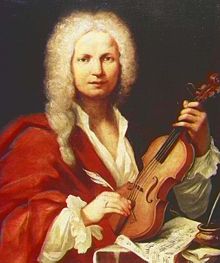- Motezuma
-
For other operas on this subject, see Montezuma#Operas.
Antonio Vivaldi  Operas
Operas- Ottone in villa (1713)
- Orlando finto pazzo (1714)
- Nerone fatto Cesare (1715)
- Arsilda, regina di Ponto (1716)
- La costanza trionfante (1716)
- L'incoronazione di Dario (1717)
- Tieteberga (1717)
- Armida al campo d'Egitto (1718)
- Scanderbeg (1718)
- Teuzzone (1719)
- Tito Manlio (1719)
- La verità in cimento (1720)
- La Silvia (1721)
- Ercole su'l Termodonte (1723)
- Dorilla in Tempe (1726)
- Farnace (1727)
- Orlando furioso (1727)
- Argippo (1730)
- Motezuma (1733)
- L'Olimpiade (1734)
- Bajazet (1735)
- Griselda (1735)
Motezuma is an opera in three acts by Antonio Vivaldi with an Italian libretto by Girolamo Giusti. The first performance was given in the Teatro Sant'Angelo in Venice on 14 November 1733. (In earlier reference books the opera is referred to as Montezuma, but since the reappearance of the original manuscript this has been corrected to Motezuma.)
The music was supposed to be have been lost, but it was discovered in 2002 in the archive of the music library of the Sing-Akademie zu Berlin, an independent old choral association with a rich musical tradition. After World War II, their library was captured by the Red Army, and taken to the Soviet Union. Eventually it ended up in Kiev, now in Ukraine. Following the restitution of the collection to Germany, the fragmentary score (the beginning of the first act and large parts of third are missing) was identified by the musicologist Steffen Voss. Musicologists began working on reconstructing a version suitable for performance.
A concert version of the opera, apparently the first performance since the 18th century, was performed on 11 June 2005 in the Concert Hall De Doelen in Rotterdam conducted by Federico Maria Sardelli.
On July 18 2005, a version of Motezuma was supposed to have been performed by the Opera Barga Festival in Barga, Italy, also conducted by Sardelli. It did not happen due to a copyright dispute, as noted below. The staged modern world premiere was held on 21 September 2005 in Düsseldorf, Germany, as part of the altstadtherbst kulturfestival, in a production by Uwe Schmitz-Gielsdorf, designed by Paolo Atzori, with l’Orchestra Modo Antiquo conducted again by Sardelli. The American premiere was held on March 28, 2009, in Long Beach, California, staged and performed by the Long Beach Opera with musical accompaniment by Musica Angelica directed by David Schweizer and conducted by Andreas Mitisek.[1]
There is also a Deutsche Grammophon recording available, by Il Complesso Barocco, conducted by Alan Curtis, which is based on a reconstruction of the complete opera by the Italian baroque violinist and composer Alessandro Ciccolini.
Contents
Copyright dispute
Perhaps as part of their bid to become acceptable to the European Union, Ukraine returned all the books from the Sing-Akademie to their rightful owners. The archive decided to organize their collection, apparently also restricting access, and supposedly having plans to publish their manuscripts.
The Sing-Akademie asserted that they had full copyright, including derivative rights such as performance rights, to the opera. While common sense would lead one to believe that a work presented in 1733 would not have copyright protection (and, even if so, that only Vivaldi's heirs would have these rights) the judicial case was not clear.
The Rotterdam performance went ahead only after a substantial payment to the Sing-Akademie, and the Barga performance was halted by an injunction, with a potential €250,000 penalty for non-compliance. The reason given was that German law offers copyright protection to entities that publish previously inaccessible works. The injunction was issued one week before the date of the performance, so a "pastiche" was performed: the Motezuma libretto recitatives were spoken, and other Vivaldi arias sung between them.
As of mid-September 2005, the injunction was lifted which allowed the Düsseldorf premiere to take place.
Roles
Role Voice type Premiere cast, 14 November 1733
(Conductor: – )Motezuma, Emperor of Mexico bass-baritone Massimiliano Miler Mitrena, his wife contralto Anna Girò Teutile, his daughter soprano Gioseffa Pircker Fernando, General of the Spanish armies soprano castrato Francesco Bilanzoni Ramiro, his younger brother mezzo-soprano en travesti Angiola Zanuchi Asprano, General of the Mexicas soprano castrato Marianino Nicolini References in popular culture
- In Alejo Carpentier's novel Baroque Concerto, the nameless main character, who is related to a Conquistador, visits Venice in 1709. He befriends Antonio Vivaldi, as well as Domenico Scarlatti and George Frideric Handel. During the Carnival, he wears a mask of Montezuma. An intrigued Vivaldi asks for an explanation of the story. Upon hearing of the Spanish conquest of the Aztec Empire, Vivaldi decides to write an opera based on it. The resulting opera is Motezuma.
Sources
- ^ "Vivaldi's Motezuma given U.S. premiere by Long Beach Opera", Los Angeles Times, 29 March 2009.
- Gabriel Pareyon (in Spanish), "Estreno mundial del Motezuma de Vivaldi", 15 June 2005 (originally published by Pauta, vol. 23, no. 95, Mexico, DF : 50–59).
- Alan Riding, Motezuma's Revenge – A Long-Lost Vivaldi Opera Gets Its Modern Premiere, International Herald Tribune/New York Times, 15 June 2005
- Vivaldi's Motezuma Has Dusseldorf Premiere After Court Win, Bloomberg News, 23 September 2005.
- Planned Stagings of Vivaldi's Long-Lost Opera Motezuma Derailed by Copyright Claim and Court Injunction Agence France-Presse, 12 July 2005.
Categories:- Operas by Antonio Vivaldi
- Italian-language operas
- 1733 operas
- Operas
- Aztecs in fiction
- Operas set in Mexico
Wikimedia Foundation. 2010.
